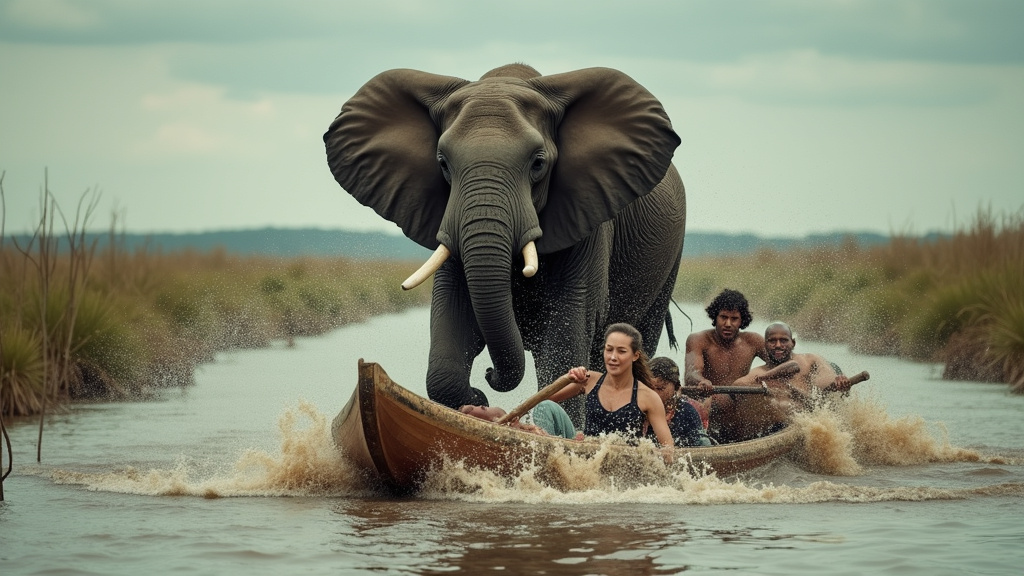Elephant Attack in Okavango Delta Highlights Dangers of Wildlife Tourism
A terrifying encounter in Botswana’s Okavango Delta has sent shockwaves across the internet, as a viral video captures the harrowing moment a protective bull elephant charged at a group of tourists, capsizing their canoes and briefly holding a woman underwater. The incident, which occurred on Saturday, September 27, 2025, serves as a stark reminder of the unpredictable nature of wildlife and the critical importance of maintaining respectful distances.
The Harrowing Encounter
The event unfolded during a serene mokoro (traditional dugout canoe) safari through the shallow, crocodile-infested waters of the Okavango Delta. Four tourists, identified as two couples from Britain and the United States, were being guided through the waterways when their canoes reportedly drifted too close to a mother elephant and her young calves. In an immediate display of protective aggression, a nearby bull elephant launched a violent charge towards the unsuspecting group.
Video footage that has since gone viral shows the massive 6-ton animal rushing through the reeds. The elephant used its trunk and tusks to overturn the two canoes, plunging the tourists into the murky water. The guides steering the vessels reportedly fled to the safety of the riverbank.
In a particularly chilling moment captured on camera, as the woman attempted to wade through the water, the elephant turned back and used its trunk to push her underwater, holding her submerged for several harrowing seconds. Fortunately, the murky water obscured her from the elephant’s direct line of sight, and the animal eventually retreated back to its herd, leaving the tourists shaken but alive.
A Lucky Escape Amidst Danger
While the tourists escaped serious physical injury, the incident resulted in the loss and damage of personal electronics, including phones and cameras. Experts and witnesses alike have emphasized the sheer luck involved in their survival. A former South African game ranger, who reviewed the footage, described the escape as “incredibly lucky,” noting that had the elephant held the woman down for a few more seconds or used its tusks, the outcome could have been fatal.
“This bull attacked because it was protecting its young,” explained one expert, suggesting the guides may have misjudged the safe distance from the protective mother and her calves, making a potentially fatal mistake.
Elephant Behavior and Wildlife Tourism Risks
Elephants are renowned for their intelligence and complex social structures, but their protective instincts, particularly regarding their young, are exceptionally strong. Female elephants, in particular, exhibit fierce vigilance around calves, forming defensive circles and reacting aggressively to perceived threats. While typically peaceful, this primal instinct to safeguard their offspring can transform them into formidable and dangerous adversaries.
Botswana is home to the world’s largest elephant population, estimated at around 130,000 individuals, with a significant portion inhabiting the Okavango Delta, a UNESCO World Heritage site. While wildlife tourism is a major draw, this incident underscores the inherent risks associated with close encounters in the wild. Conservationists and wildlife authorities continually stress the necessity of maintaining a safe and respectful distance from all wild animals.
This event follows other notable incidents, including a tragic case in Zambia earlier this year where a protective female elephant killed two tourists during a walking safari, demonstrating that such encounters can have fatal consequences. While Botswana has banned elephant-back safaris since 2017 due to ethical concerns, traditional mokoro excursions, as seen in this news, remain popular but demand extreme caution.
Netizens Weigh In
The viral video has sparked widespread online discussion, with netizens emphasizing the need for greater respect for wildlife and their personal space. Comments flooded social media platforms, with many users highlighting that elephants, despite their often docile appearance, possess immense power and possess a strong drive to protect their young. The viral nature of the footage has brought this critical news into the global spotlight, generating top discussions about responsible tourism practices and the raw power of nature.
This trending incident serves as a poignant reminder that while the allure of witnessing wildlife in its natural habitat is powerful, respecting the boundaries of these magnificent creatures is paramount to ensuring both human safety and the well-being of the animals themselves. The hyped video is a wake-up call for the tourism industry and visitors alike to prioritize safety protocols and mindfulness when venturing into the wild.





